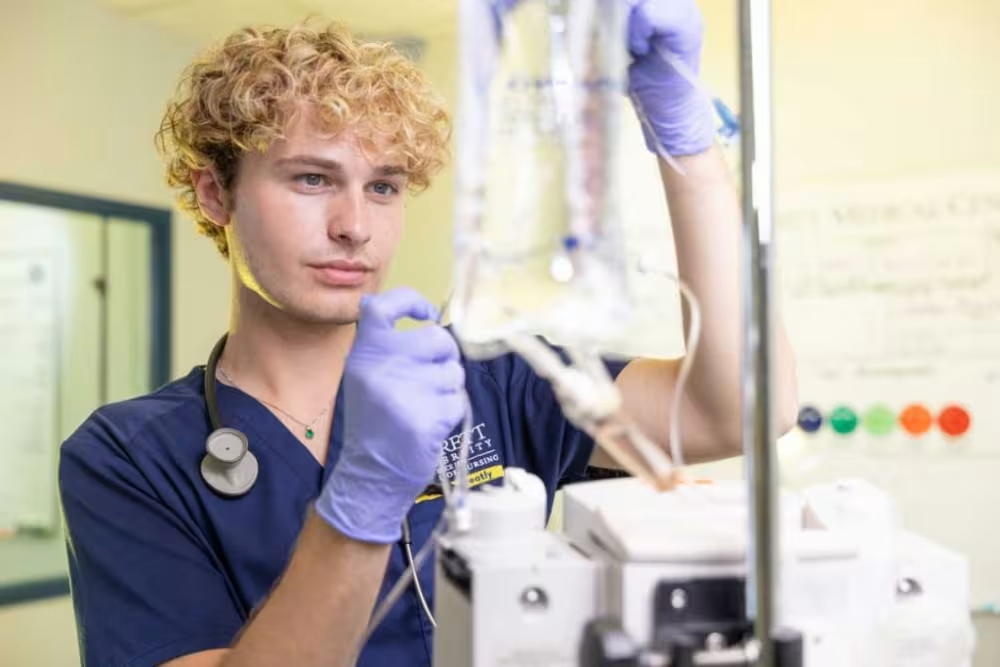13 Nursing Specialties in High Demand Right Now
Each blog post is dated and contains accurate information as of that date. Certain information may have changed since the blog post publication date. If you would like to confirm the current accuracy of blog information, please visit our ABSN overview page or contact admissions at (866) 483-8705.
There are many different types of nurses who specialize in care for various patient populations or certain medical conditions. As an RN, you could choose from nursing specialties like emergency room, mental health, critical care, and neonatal nursing. Advanced nursing roles include nurse anesthetist and nurse midwife.

When you pass the NCLEX-RN exam and receive your nursing license, you can choose from a broad assortment of nursing specialties. A nursing specialty is an area of specialization that can be defined by patient population, hospital department, or medical condition. There are many different types of nurses you could become, from primary care to critical care nurse.
Whichever nursing career path is right for you, your journey can begin with enrolling in the Accelerated Bachelor of Science in Nursing (ABSN) program at Averett University. If you have a non-nursing bachelor’s or a minimum of 60 college credits, you can earn a Bachelor of Science in Nursing (BSN) in as few as 16 months with Averett’s Accelerated BSN program in Norfolk, Virginia.
As you explore the types of nursing careers, you’ll want to consider your personal strengths, the types of patients you want to work with, and which environments appeal to you. For example, some specialties are fast-paced, like emergency room nursing, while others have a slower pace, like home health nursing.
The Best Nursing Specialties Based on Demand
Many types of nurses are in high demand and generally have the same entry-level career requirements: a nursing degree and state-issued nursing license. Some nursing specialties are associated with professional certifications, like the critical care registered nurse (CCRN) designation. These certifications aren’t generally necessary to get started in the career, but you may want to pursue one or two after gaining clinical experience.
According to the U.S. Bureau of Labor Statistics (BLS), the median annual salary for all types of RNs is $93,600 as of May 2024. In hospital settings, the median annual salary is $97,260.

Learn more about how to excel during your clinical rotations in the Averett ABSN program.
1. Emergency Room Nurse
Are you capable of keeping a level head during a crisis? Can you think well on your feet and stay calm? Consider becoming an emergency room (ER) nurse.
ER nurses work in ERs, which are usually attached to hospitals but may sometimes be freestanding facilities. The job of an ER nurse includes the following:
- Assess patients quickly and determine which patients need treatment right away
- Administer life-saving interventions to patients at imminent risk of death
- Stabilize incoming patients, administer treatments, and discharge or admit patients to the hospital
- Provide patient education
Patients go to the ER for all sorts of reasons, such as broken bones, severe dehydration, and lacerations. An ER nurse must be prepared for anything at any time.
2. Critical Care Nurse
Critical care nurses aren’t the same as ER nurses, as these nurses work in intensive care units (ICUs). ICU nurses work with seriously ill admitted patients, such as those recovering from a heart attack, stroke, or any other serious condition.
Like ER nurses, critical care nurses must be prepared for anything. A patient may suddenly suffer cardiopulmonary arrest and require the team to immediately initiate resuscitation efforts to save their life.

3. Neonatal Nurse
In a perfect world, parents could welcome their newborns with nothing but joy. Yet, newborns aren’t always without health problems, and sometimes those problems are serious, even life-threatening. Neonatal nurses specialize in caring for newborns facing all sorts of medical issues, including:
- Cardiac malformations
- Congenital disabilities
- Infections
- Premature birth/low birth weight
Working as a neonatal nurse isn’t easy, even if you’re passionate about newborn care. Sometimes, these little patients don’t overcome their challenges, and the heartbreak can be difficult to bear. If you’re thinking about becoming a neonatal nurse, it’s helpful to develop strong emotional resilience and be effective at counseling bereaved parents.

4. Home Health Care Nurse
A home health nurse travels to patients’ homes to deliver care. A home health nurse will typically work with the following types of patients:
- Critically ill
- Disabled
- Elderly
- Post-operative or in recovery from an accident
- Pregnant/postpartum
A home health care nurse handles many of the same tasks as an RN caring for hospitalized patients, but works with greater autonomy. Because of this, home health agencies generally require applicants to have at least a couple of years of clinical experience.
Have you considered any of these remote nursing career options that require a BSN?

5. Mental Health Nursing
Mental health nurses specialize in caring for patients who have mental health disorders, including substance use disorders. They develop and implement care plans, administer medications and other treatments, and counsel patients and their loved ones.
They also provide crisis intervention and patient advocacy. These nurses must have emotional resilience, compassion, and professional boundaries.
6. Medical-Surgical Nurse
Medical-surgical (med-surg) nursing is the largest nursing specialty, as these nurses provide care to a vast range of patients of all ages and with various medical conditions.
Med-surg nurses can work at the bedside, in the operating room, and in the exam room. They are typically employed in an inpatient setting. Time management, organization, and multitasking are essential for this role.

7. Correctional Facility Nurse
Correctional facilities need nurses to care for inmates and defendants. Often, these nurses are the primary providers, and they are responsible for their patients' physical and mental health.
They may conduct assessments, provide crisis intervention, manage chronic conditions, deliver emergency care, promote infection control and sanitation, and more. Professional boundaries and emotional resilience are important for this role.
According to the BLS, nurses working in government settings earned a median annual salary of $106,480 as of May 2024.
8. Long-Term Care Nurse
Long-term care nurses work with patients who are living in nursing homes and other residential care facilities. They support patients with chronic and progressive health issues, including heart disease, diabetes, and Alzheimer’s disease. Family caregiver education is an important part of the job, and compassion and interpersonal skills are helpful.
According to the BLS, nurses working in nursing and other residential care facilities earned a median annual salary of $81,820 as of May 2024.
9. Primary Care Nurse
These types of nurses work in outpatient settings in family care practices, where they focus on preventive health services, such as health screenings and vaccinations. They assess patients, manage chronic conditions, provide patient education, handle wound care, and more.
According to the BLS, nurses working in ambulatory care settings earned a median annual salary of $83,780 as of May 2024.

APRN Nursing Specialties
Although many nursing specialties in demand are open to nurses with a BSN, others require more advanced education and training. An advanced practice registered nurse (APRN) has earned a Master of Science in Nursing or a Doctor of Nursing Practice and completed the board certification requirements for their chosen specialty.
Nurse anesthetists, nurse midwives, clinical nurse specialists, and nurse practitioners are APRNs.
The demand for APRNs is considerable. The U.S. Bureau of Labor Statistics (BLS) estimates a 40% job growth for nurse anesthetists, nurse midwives, and nurse practitioners from 2023 to 2033, which is much faster than average. This indicates that employers expect to hire about 141,200 APRNs during this period.
10. Nurse Anesthetist
A certified registered nurse anesthetist (CRNA) specializes in administering pain medications and anesthesia to patients undergoing surgery. A CRNA can also work with patients receiving conscious sedation and patients in labor who require epidurals or other types of pain management.
This nursing specialty requires the utmost attention to detail and the ability to make sound clinical decisions in difficult situations, as the patients’ lives are literally in the CRNA’s hands. It’s a role with a great deal of responsibility, which is why CRNAs are the highest-paid nurses. According to the BLS, CRNAs made a median annual salary of $223,210 as of May 2024.
11. Nurse Midwife
Certified nurse midwives (CNMs) are known for providing reproductive healthcare to expecting mothers, but also work with patients across the lifespan. Nurse midwives provide gynecological and primary healthcare services and prenatal, childbirth, and postnatal care. They also care for newborns.
According to the BLS, CNMs made a median annual salary of $128,790 as of May 2024.

12. Nurse Practitioner
Nurse practitioners (NPs) specialize in several areas, such as primary care, cardiac care, oncology, and pediatrics. They deliver direct patient care, including assessments, diagnostics, treatments, and ongoing management. Although regulations differ from state to state, NPs generally enjoy greater autonomy than RNs and even other APRNs, such as prescribing authority.
According to the BLS, NPs made a median annual salary of $129,210 as of May 2024.
13. Clinical Nurse Specialist (CNS)
A CNS can diagnose and treat patients across the continuum of care, providing direct patient care and working to advance nursing practice by influencing organizational policies and procedures.
Often, a CNS is relied upon to manage highly complex conditions. A CNS can work in acute care, primary care, neonatal care, and beyond. They may serve as nurse researchers, educators, consultants, and clinical leaders.
Begin Your Nursing Journey in Averett’s ABSN Program
No matter where your nursing career takes you, Averett University can help you get started. Regardless of where your career takes you, the ABSN curriculum will prepare you with the foundation needed for all specialties.
Benefit from our small class sizes, hybrid learning approach, personalized attention, and clinical learning experiences that let you explore different types of nursing.
Contact an admissions advisor today and take the next step in your career.
